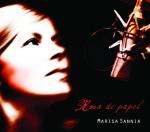

Marisa Sannia has written: “We don’t have to read poetry with our eyes , we have to read it with the voice. The eyes help us to decipher it, the ears help us to discover the rhythm of it, but it’s with the voice that we can recreate it”.
The sound of language- Marisa says- and word’s magic take us on poetry’s path, between memory and dream. Music, sounds, words unfold like plots and drawings touching the deep and mysterious feelings of the soul.
Mediterranean and sunny melodies melt with words in atmospheres where it’s difficult to distinguish ancient and contemporary, language, poet, composer and interpreter.
The passion for her country and the interest for the Sardinian popular tradition took Marisa Sannia, in the 90’s, to set into music Antioco Casula’s and Francesco Masala’s verses, and Maria Lai’s lullabies.
Her aptitude for search in literature and in folklore took Marisa Sannia close to the Hispanic-Andalusian world of Federico Garcia Lorca, that pervades her last record, “Rosa de Papel”, posthumously published.
With all humility and respect, Marisa improved her Spanish and she probed the deep sea of Lorca’s poetry, choosing and collecting words and compositions of the great Andalusian poet. The lyrics of each song (except for pequeño vals vienes of Leonard Cohen and “La cancion de la mariposa” of Amancio Prada) were all set into music thanks to her creativity, enchanted by the rhythm and by the intrinsic melody of every Lorca’s vers . Instead of drawing from the celebrated Romancero Gitano, she drew from the early “Libro de Poemas”or from other following Lorca’s collections.
The masterly work of the arranger Marco Piras, always guided by Marisa Sannia’s clear comprehending view, completed the work.
The final result of “Rosa de Papel” is a fresco in which music and poetry marry with an excellent freshness and they give us back a nimble Lorca, who’s in love with the song form.
BiographyMarisa Sannia was born in Iglesias, in Sardinia in the 1947 and died before her time on the 14th April 2008. She started her artistic career in1966, as an interpreter of songs written by Sergio Endrigo, Luis Bacalov, Armando Trovajoli, Sergio Bardotti, Francesco De Gregori, Minghi, Vecchioni, Don Backi, De Morales, Canfora, Lauzi.
In 1968 she had a first major success at Sanremo’s Festival, ranking second with the song “Casa Bianca”. In the first 70’s she took up theatre, acting in two successful musicals.
Then follows the publication, as a singer-songwriter, of her first collection called “La Pasta Scotta”.
She rediscovered her own language and set into music the lyrics of Antioco Casula, a sardinian poet of the late ‘800, in a cd of the 1993, “Sa Oghe De Su Entu e De Su Mare”.
From the encounter with poetry originated her cooperation with the contemporary writer Francesco Masala. In fact she published, in the cd “Melagranada”of 1997, a collection drawed from the work “Poesias in Duas Limbas”. In 2003 a third collection was published, “Nanas e Janas”, with Sardinian lyrics and new music written by the artist. This long poetical and musical quest is summed up in the recital “Canzoni tra Due Lingue. Sul Cammino Della Poesia”, presented in the review “La Notte dei Poeti” at Nora’s roman amphitheatre, at Taormina’s Festival, and at “Roma incontra il mondo” at Villa Ada. Her latest work, the cd “Rosa de Papel”is the result of the fascinating search of Federico Garcia Lorca’s life and poetic world, and it was posthumously published.

























